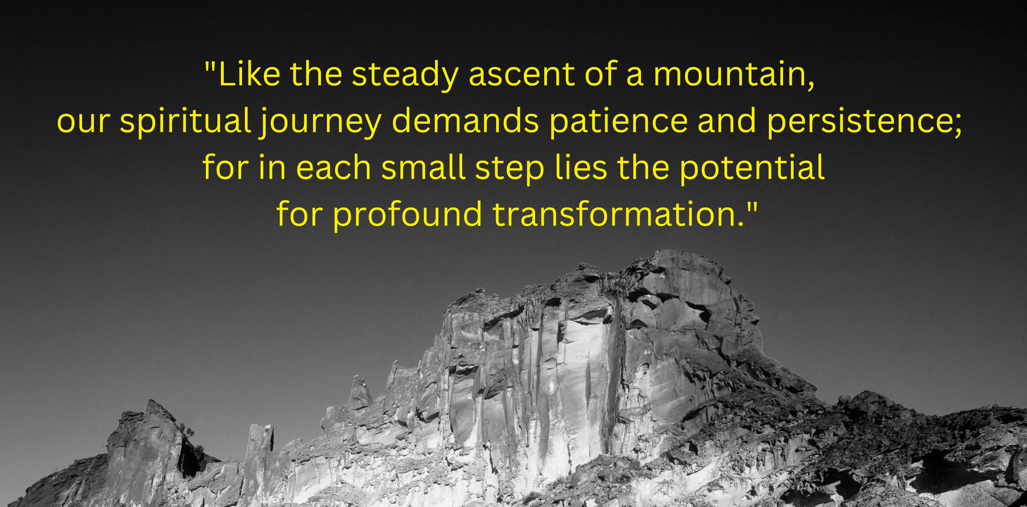Nurturing the Mindset for Spiritual Transformation: A Journey of Faith (Pt. 1)
Mark Ellard
9/17/20235 min read


1. Embrace a Learning Attitude
In the realm of spiritual transformation, of becoming more like Jesus,, an open and learning attitude is essential. It’s another form of surrendering our mind and thoughts to those of God. This mindset is about actively seeking knowledge and understanding, not just in theory but in practical application. Being open to what the Spirit of God wants to do and where He wants to lead you is critical. This is especially true when we begin to realize that what God is wanting to teach us goes counter to some of the things we heard and were taught by those we love and respect.
Alex was a college junior at a respected state school. Alex grew up in a family where he was taught that working hard, saving diligently, and investing wisely to ensure financial stability and personal success was of paramount importance. Wealth was viewed as a symbol of personal achievement and security. But then things began to change.
Alex enrolled in a world religions class. His curiosity about Jesus was piqued. Intrigued, he started attending a local church and bible study groups. He not just as a passive listener but an active seeker. He wanted to know Jesus, what He was like. And so Alex began asking questions and delving deep into the scriptures and Christian history. This thirst for understanding transformed his superficial interest into a profound, personal faith journey. He soon realized that wealth is not solely for personal comfort but is a gift from God. It is to be used for His purposes, including helping others. This new perspective challenged Alex to rethink his approach to money. Instead of seeing it solely as a means for personal security and luxury, he starts viewing financial resources as tools for generosity. It wasn’t long before Alex began supporting his local church through tithes and offerings, donating to charities, and helping individuals in need.
Alex was eager to learn, open to the truths God would reveal to him. It took his family a considerable amount of time to accept his new learnings and lifestyle change. But Alex’s desire to become like Jesus was paramount in his heart. His willingness to accept the truths of what God wanted for him led to His transformation.
Becoming like Jesus, an enriching journey, is not unlike an explorer traversing diverse landscapes on his way to the summit. This journey, especially in the challenging first few months or years as a new believer, requires specific ways of thinking or mindset.


2. Cultivate Trust in God
Cultivating trust in God is a foundational aspect of Christian spiritual life, particularly as one seeks to emulate the character and teachings of Jesus Christ. This trust becomes increasingly critical when engaging in spiritual disciplines. When we engage in spiritual exercises like fasting, study, or silence, our natural inclinations are often challenged. It becomes difficult for us. It is at that point that trust in God to provide whatever we need is critical.
Take for example, the discipline of fasting. Fasting from food or other comforts inherently involves a level of physical and mental discomfort. Trusting in God’s strength is crucial to endure this practice, especially when our physical strength wanes. It’s a tangible expression of reliance on God, not just for physical sustenance, but for spiritual nourishment and endurance.
So when becoming like Jesus is the goal, and fasting or any discipline done for the sake of Christlikeness is the exercise, trusting Him to provide becomes the lifeline that connects us and our efforts to the enabling power of God. It is the faith in Him to transform us that turns these disciplines from mere religious activities into transforming experiences that He uses to shape and mold us.
3. Be Patient in Spiritual Growth
Spiritual development, similar to the growth & development of a person or the blossoming of a flower, requires time, patience, and nurturing. It's a journey marked not by leaps and bounds but by gradual, often imperceptible growth. The incorporation of activities or exercises like fasting, solitude, prayer, study, etc., for transformation, is not a magical pill or a means of manipulating God. Far from it! Engagement in such exercises is really a plea to God. Like an athlete training for an event, we set aside something now like our comfort, in order to experience something greater in the future. Mark’s story offers a poignant illustration of this truth.
Mark became a believer in his mid-twenties. Like many of us, he embarked on his spiritual journey with enthusiasm and vigor. He was eager to deepen his faith and expected quick, tangible progress. Raised in a fast-paced, results-driven society, Mark’s approach to spiritual growth mirrored his approach to life: immediate results and clear milestones. However, spiritual development rarely adheres to such a straightforward path. An opportunity arose for Mark to join a mission trip to a rural community. He joined with the hope of both contributing to the community and accelerating his spiritual growth. The trip, however, presented challenges that Mark hadn’t anticipated. He found himself struggling to connect deeply with the local community and their way of worship, which was far removed from his experience back home.
During his stay, Mark had a conversation with an elderly man named Joseph, who had served his community for decades. Mark expressed his frustrations and impatience with his perceived lack of spiritual growth. Joseph listened intently, then shared a perspective that would become a turning point for Mark.
He led Mark to an old tree just outside the church. Joseph explained how the tree had been there for generations, growing slowly yet steadfastly. It weathered storms and droughts, and its growth wasn’t always visible. Over the years, however, it had become a strong, deeply rooted part of the community.
“Spiritual growth,” Joseph explained, “is like this tree. It doesn't happen overnight. It needs time, seasons, nourishment, and above all, patience. Each season has a role, and each challenge or delay contributes to your strength and depth.”
This struck a chord with Mark. He began to reflect on his journey. His impatience had led to many failed goals and dreams. And now he realized his impatience was also impacting his thinking on the value of disciplines like fasting, prayer, etc. But he began to realize that, like an athlete preparing to compete in an event, he must be patient. He must be persistent. Transformation does not usually happen overnight.
Upon returning home, Mark carried with him the lesson of the tree. He approached his spiritual disciplines—prayer, study, service—with a new mindset. He understood that spiritual growth was a lifelong journey, marked by gradual progression and that each phase of his faith journey was valuable.
Mark’s story serves as a reminder that spiritual growth is not a race but a journey. It's a process that unfolds in God’s timing, requiring patience, trust, and a willingness to grow through every experience. Like the tree, our faith, nurtured by our willingness to engage in spiritual exercises, can grow deep roots and strong branches. We must allow the time to do so naturally and patiently.



